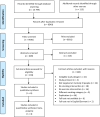Add-on exercise interventions for smoking cessation in people with mental illness: a systematic review and meta-analysis
- PMID: 35729669
- PMCID: PMC9210718
- DOI: 10.1186/s13102-022-00498-y
Add-on exercise interventions for smoking cessation in people with mental illness: a systematic review and meta-analysis
Abstract
Background: Smoking is the most common substance use disorder among people with mental illness. In contrast to people without mental illness, among whom the proportion of smokers has declined in recent decades, the proportion of smokers among people with mental illness remains high. There is a growing body of literature suggesting the use of exercise interventions in combination with smoking cessation in people without mental illness, but to our knowledge the available studies on this treatment option in people with mental illness have not been systematically reviewed. Therefore, this systematic review and meta-analysis aims to assess the effectiveness of exercise interventions as an adjunctive treatment for smoking cessation in people with mental illness.
Methods: Electronic databases (PubMed, Web of Science, PsycInfo, Sport Discus and Base) were searched for randomised controlled trials and prospective single-group studies that investigated exercise interventions in combination with smoking cessation programmes alone or in comparison with a control group in people with mental illness. A meta-analysis using the Mantel-Haenszel fixed-effect model was conducted to estimate the overall effect of treatment on smoking cessation (abstinence rate at the end of the intervention and at 6-month follow-up).
Results: Six studies, five randomised controlled trials and one study with a prospective single-group design, were included in the systematic review and four randomised controlled trials were included in the meta-analysis. The meta-analysis found a significantly higher abstinence rate after additional exercise at the end of the intervention [risk ratio (RR) 1.48, 95% confidence interval (CI) 1.13-1.94], but not at the 6-month follow-up (RR 1.34, 95% CI 0.89-2.04).
Conclusions: Exercise appears to be an effective adjunctive therapy to temporarily increase abstinence rates in individuals with mental illness at the end of the intervention. However, due to the small number of included studies and some risk of bias in the included studies, the results should be treated with caution. Therefore, future studies with larger samples are needed to provide a more accurate estimate of the effect in people with mental illness. Registration The systematic review and meta-analysis were registered in the International Prospective Register of Systematic Reviews (PROSPERO) (registration number: CRD42020178630).
Keywords: Exercise; Mental disorder; Mental illness; Meta-analysis; Physical activity; Smoking; Smoking cessation; Systematic review.
© 2022. The Author(s).
Conflict of interest statement
Stefanie Schöttl, Martin Niedermeier, Prisca Kopp-Wilfling, Anika Frühauf, Carina Bichler, Monika Edlinger, Bernhard Holzner and Martin Kopp declare no competing interests.
Figures


Similar articles
-
Interventions for waterpipe smoking cessation.Cochrane Database Syst Rev. 2023 Jun 7;6(6):CD005549. doi: 10.1002/14651858.CD005549.pub4. Cochrane Database Syst Rev. 2023. PMID: 37286509 Free PMC article. Review.
-
Different doses, durations and modes of delivery of nicotine replacement therapy for smoking cessation.Cochrane Database Syst Rev. 2019 Apr 18;4(4):CD013308. doi: 10.1002/14651858.CD013308. Cochrane Database Syst Rev. 2019. Update in: Cochrane Database Syst Rev. 2023 Jun 19;6:CD013308. doi: 10.1002/14651858.CD013308.pub2. PMID: 30997928 Free PMC article. Updated.
-
Effectiveness of smoking cessation on the high-risk population of lung cancer with early screening: a systematic review and meta-analysis of randomized controlled trials until January 2022.Arch Public Health. 2023 Jun 3;81(1):101. doi: 10.1186/s13690-023-01111-5. Arch Public Health. 2023. PMID: 37268972 Free PMC article.
-
Effectiveness of Peer-Support Interventions for Smoking Cessation: A Systematic Review and Meta-analysis.Nicotine Tob Res. 2023 Aug 19;25(9):1515-1524. doi: 10.1093/ntr/ntad059. Nicotine Tob Res. 2023. PMID: 37042206
-
Pharmacological and behavioural interventions to promote smoking cessation in adults with schizophrenia and bipolar disorders: a systematic review and meta-analysis of randomised trials.BMJ Open. 2019 Nov 28;9(11):e027389. doi: 10.1136/bmjopen-2018-027389. BMJ Open. 2019. PMID: 31784428 Free PMC article.
Cited by
-
Smoking cessation and exercise: perspectives from smokers with and without mental health problems.Front Public Health. 2025 May 16;13:1589719. doi: 10.3389/fpubh.2025.1589719. eCollection 2025. Front Public Health. 2025. PMID: 40453502 Free PMC article.
-
Effect of exercise intervention on smoking cessation: a meta-analysis.Front Physiol. 2023 Aug 8;14:1221898. doi: 10.3389/fphys.2023.1221898. eCollection 2023. Front Physiol. 2023. PMID: 37614760 Free PMC article.
-
Multicentre Pilot Study to Evaluate the Efficacy of Targeted Exercise in Combination with Cytisinicline on Smoking Cessation at 12 Months: MEDSEC-CTA.Healthcare (Basel). 2024 Dec 12;12(24):2516. doi: 10.3390/healthcare12242516. Healthcare (Basel). 2024. PMID: 39765943 Free PMC article.
-
Non-pharmacological interventions for smoking cessation: analysis of systematic reviews and meta-analyses.BMC Med. 2023 Sep 29;21(1):378. doi: 10.1186/s12916-023-03087-z. BMC Med. 2023. PMID: 37775745 Free PMC article. Review.
References
-
- Deenik J, Tenback DE, Tak ECPM, Hendriksen IJM, van Harten PN. Improved psychosocial functioning and quality of life in inpatients with severe mental illness receiving a multidisciplinary lifestyle enhancing treatment. The MULTI study II. Ment Health Phys Act. 2018;15:145–152. doi: 10.1016/j.mhpa.2018.10.004. - DOI
Grants and funding
LinkOut - more resources
Full Text Sources

